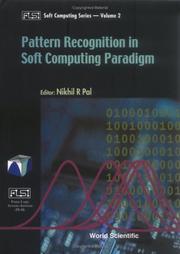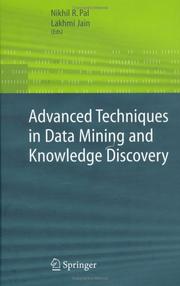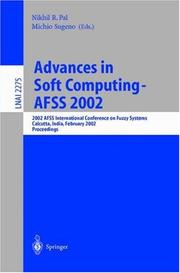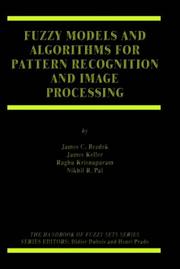| Listing 1 - 10 of 12 | << page >> |
Sort by
|

ISBN: 1281960675 9786611960674 9812811699 9789812811691 9789810244910 9810244916 9781281960672 Year: 2001 Publisher: Singapore ; New Jersey : World Scientific,
Abstract | Keywords | Export | Availability | Bookmark
 Loading...
Loading...Choose an application
- Reference Manager
- EndNote
- RefWorks (Direct export to RefWorks)
Pattern recognition (PR) consists of three important tasks: feature analysis, clustering and classification. Image analysis can also be viewed as a PR task. Feature analysis is a very important step in designing any useful PR system because its effectiveness depends heavily on the set of features used to realise the system. A distinguishing feature of this volume is that it deals with all three aspects of PR, namely feature analysis, clustering and classifier design. It also encompasses image processing methodologies and image retrieval with subjective information. The other interesting aspect
Pattern recognition systems. --- Pattern perception. --- Design perception --- Pattern recognition --- Form perception --- Perception --- Figure-ground perception --- Pattern classification systems --- Pattern recognition computers --- Pattern perception --- Computer vision

ISBN: 1852338679 9786611180607 1281180602 1846281830 1447157524 Year: 2004 Publisher: New York : Springer-Verlag,
Abstract | Keywords | Export | Availability | Bookmark
 Loading...
Loading...Choose an application
- Reference Manager
- EndNote
- RefWorks (Direct export to RefWorks)
Data mining and knowledge discovery (DMKD) is a rapidly expanding field in computer science. It has become very important because of an increased demand for methodologies and tools that can help the analysis and understanding of huge amounts of data generated on a daily basis by institutions like hospitals, research laboratories, banks, insurance companies, and retail stores and by Internet users. This explosion is a result of the growing use of electronic media. But what is data mining (DM)? A Web search using the Google search engine retrieves many (really many) definitions of data mining. We include here a few interesting ones. One of the simpler definitions is: “As the term suggests, data mining is the analysis of data to establish relationships and identify patterns” [1]. It focuses on identifying relations in data. Our next example is more elaborate: An information extraction activity whose goal is to discover hidden facts contained in databases. Using a combination of machine learning, statistical analysis, modeling techniques and database technology, data mining finds patterns and subtle relationships in data and infers rules that allow the prediction of future results. Typical applications include market segmentation, customer profiling, fraud detection, evaluation of retail promotions, and credit risk analysis [2].
Knowledge acquisition (Expert systems). --- Knowledge acquisition (Expert systems) --- Data mining --- Computer Science --- Engineering & Applied Sciences --- Data mining. --- Acquisition, Knowledge (Expert systems) --- Expertise acquisition (Expert systems) --- Algorithmic knowledge discovery --- Factual data analysis --- KDD (Information retrieval) --- Knowledge discovery in data --- Knowledge discovery in databases --- Mining, Data --- Computer science. --- Data structures (Computer science). --- Algorithms. --- Database management. --- Computer Science. --- Data Structures, Cryptology and Information Theory. --- Data Structures. --- Database Management. --- Information Systems Applications (incl. Internet). --- Algorithm Analysis and Problem Complexity. --- Data base management --- Data services (Database management) --- Database management services --- DBMS (Computer science) --- Generalized data management systems --- Services, Database management --- Systems, Database management --- Systems, Generalized database management --- Electronic data processing --- Algorism --- Algebra --- Arithmetic --- Information structures (Computer science) --- Structures, Data (Computer science) --- Structures, Information (Computer science) --- File organization (Computer science) --- Abstract data types (Computer science) --- Informatics --- Science --- Foundations --- Database searching --- Expert systems (Computer science) --- Data structures (Computer science) --- Computer software. --- Data Structures and Information Theory. --- Software, Computer --- Computer systems --- Data structures (Computer scienc. --- Application software. --- Application computer programs --- Application computer software --- Applications software --- Apps (Computer software) --- Computer software
Digital
ISBN: 9781846281839 Year: 2005 Publisher: London Springer-Verlag London Limited
Abstract | Keywords | Export | Availability | Bookmark
 Loading...
Loading...Choose an application
- Reference Manager
- EndNote
- RefWorks (Direct export to RefWorks)
Complex analysis --- Computer science --- Information systems --- ICT (informatie- en communicatietechnieken) --- cryptologie --- complexe analyse (wiskunde) --- data mining --- informatiesystemen --- database management --- programmatielogica
Book
ISBN: 3319913417 3319913395 Year: 2019 Publisher: Cham : Springer International Publishing : Imprint: Springer,
Abstract | Keywords | Export | Availability | Bookmark
 Loading...
Loading...Choose an application
- Reference Manager
- EndNote
- RefWorks (Direct export to RefWorks)
This book is a delight for academics, researchers and professionals working in evolutionary and swarm computing, computational intelligence, machine learning and engineering design, as well as search and optimization in general. It provides an introduction to the design and development of a number of popular and recent swarm and evolutionary algorithms with a focus on their applications in engineering problems in diverse domains. The topics discussed include particle swarm optimization, the artificial bee colony algorithm, Spider Monkey optimization algorithm, genetic algorithms, constrained multi-objective evolutionary algorithms, genetic programming, and evolutionary fuzzy systems. A friendly and informative treatment of the topics makes this book an ideal reference for beginners and those with experience alike.
Engineering. --- Artificial intelligence. --- Computational intelligence. --- Computational Intelligence. --- Artificial Intelligence (incl. Robotics). --- Artificial Intelligence. --- AI (Artificial intelligence) --- Artificial thinking --- Electronic brains --- Intellectronics --- Intelligence, Artificial --- Intelligent machines --- Machine intelligence --- Thinking, Artificial --- Bionics --- Cognitive science --- Digital computer simulation --- Electronic data processing --- Logic machines --- Machine theory --- Self-organizing systems --- Simulation methods --- Fifth generation computers --- Neural computers --- Construction --- Industrial arts --- Technology --- Inteligencia Artificial (71142109) --- Bibliografía recomendada --- Soft computing --- Intelligence, Computational --- Artificial intelligence
Book
ISBN: 9781846281839 Year: 2005 Publisher: London Springer London
Abstract | Keywords | Export | Availability | Bookmark
 Loading...
Loading...Choose an application
- Reference Manager
- EndNote
- RefWorks (Direct export to RefWorks)
Data mining and knowledge discovery (DMKD) is a rapidly expanding field in computer science. It has become very important because of an increased demand for methodologies and tools that can help the analysis and understanding of huge amounts of data generated on a daily basis by institutions like hospitals, research laboratories, banks, insurance companies, and retail stores and by Internet users. This explosion is a result of the growing use of electronic media. But what is data mining (DM)? A Web search using the Google search engine retrieves many (really many) definitions of data mining. We include here a few interesting ones. One of the simpler definitions is: As the term suggests, data mining is the analysis of data to establish relationships and identify patterns [1]. It focuses on identifying relations in data. Our next example is more elaborate: An information extraction activity whose goal is to discover hidden facts contained in databases. Using a combination of machine learning, statistical analysis, modeling techniques and database technology, data mining finds patterns and subtle relationships in data and infers rules that allow the prediction of future results. Typical applications include market segmentation, customer profiling, fraud detection, evaluation of retail promotions, and credit risk analysis [2].
Complex analysis --- Computer science --- Information systems --- ICT (informatie- en communicatietechnieken) --- cryptologie --- complexe analyse (wiskunde) --- data mining --- informatiesystemen --- database management --- programmatielogica
Digital
ISBN: 9780387245799 Year: 2005 Publisher: Boston, MA Springer Science+Business Media, Inc
Abstract | Keywords | Export | Availability | Bookmark
 Loading...
Loading...Choose an application
- Reference Manager
- EndNote
- RefWorks (Direct export to RefWorks)
Mathematical statistics --- Electronics --- Applied physical engineering --- Artificial intelligence. Robotics. Simulation. Graphics --- Computer. Automation --- patroonherkenning --- beeldverwerking --- procesautomatisering --- factoranalyse --- image processing --- informatica --- elektronica --- KI (kunstmatige intelligentie) --- robots --- regeltechniek --- AI (artificiële intelligentie)

ISBN: 3540431500 3540456317 Year: 2002 Publisher: Berlin, Heidelberg : Springer Berlin Heidelberg : Imprint: Springer,
Abstract | Keywords | Export | Availability | Bookmark
 Loading...
Loading...Choose an application
- Reference Manager
- EndNote
- RefWorks (Direct export to RefWorks)
It is our great pleasure to welcome you all to the 2002 AFSS International Conference on Fuzzy Systems (AFSS 2002) to be held in Calcutta, the great City of Joy. AFSS 2002 is the ?fth conference in the series initiated by the Asian Fuzzy Systems Society (AFSS). AFSS 2002 is jointly being organized by theIndianStatisticalInstitute(ISI)andJadavpurUniversity(JU). Likeprevious conferencesinthisseries,wearesure,AFSS2002willprovideaforumforfruitful interaction and exchange of ideas between the participants from all over the globe. The present conference covers all major facets of soft computing such as fuzzy logic, neural networks, genetic algorithms including both theories and applications. Wehopethismeetingwillbeenjoyableacademicallyandotherwise. We are thankful to the members of the International Program Committee and the Area Chairs for extending their support in various forms to make a strong technical program. Each submitted paper was reviewed by at least three referees, and in some cases the revised versions were again checked by the ref- ees. As a result of this tough screening process we could select only about 50% of the submitted papers. We again express our sincere thanks to all referees for doing a great job. We are happy to note that 19 di?erent countries from all over the globe are represented by the authors, thereby making it a truly inter- tional conference. We are proud to have a list of distinguished speakers including Profs. Z. Pawlak, J. Bezdek, D. Dubois, and T. Yamakawa.
Soft computing --- Neural networks (Computer science) --- Fuzzy systems --- Computer Science --- Engineering & Applied Sciences --- Engineering. --- Artificial intelligence. --- Image processing. --- Pattern recognition. --- Robotics. --- Automation. --- Robotics and Automation. --- Image Processing and Computer Vision. --- Pattern Recognition. --- Artificial Intelligence (incl. Robotics). --- Computer vision. --- Optical pattern recognition. --- Artificial Intelligence. --- AI (Artificial intelligence) --- Artificial thinking --- Electronic brains --- Intellectronics --- Intelligence, Artificial --- Intelligent machines --- Machine intelligence --- Thinking, Artificial --- Bionics --- Cognitive science --- Digital computer simulation --- Electronic data processing --- Logic machines --- Machine theory --- Self-organizing systems --- Simulation methods --- Fifth generation computers --- Neural computers --- Optical data processing --- Pattern perception --- Perceptrons --- Visual discrimination --- Machine vision --- Vision, Computer --- Artificial intelligence --- Image processing --- Pattern recognition systems --- Optical data processing. --- Design perception --- Pattern recognition --- Form perception --- Perception --- Figure-ground perception --- Optical computing --- Visual data processing --- Integrated optics --- Photonics --- Computers --- Automatic factories --- Automatic production --- Computer control --- Engineering cybernetics --- Factories --- Industrial engineering --- Mechanization --- Assembly-line methods --- Automatic control --- Automatic machinery --- CAD/CAM systems --- Robotics --- Automation --- Optical equipment --- Pattern perception.

ISBN: 0792385217 Year: 1999 Publisher: Boston ; London ; Dordrecht : Kluwer academic publishers,
Abstract | Keywords | Export | Availability | Bookmark
 Loading...
Loading...Choose an application
- Reference Manager
- EndNote
- RefWorks (Direct export to RefWorks)
Cluster analysis. --- Computer vision. --- Fuzzy algorithms. --- Image processing. --- Optical pattern recognition. --- Basic Sciences. Mathematics --- Mathematical Models, Simulation Models --- Mathematical Models, Simulation Models. --- Optical pattern recognition --- Fuzzy algorithms --- Cluster analysis --- Image processing --- Computer vision --- Reconnaissance optique des formes (informatique) --- Algorithmes flous --- Classification automatique (statistique) --- Traitement d'images --- Vision par ordinateur --- Algorithmes flous. --- Traitement d'images. --- Vision par ordinateur.
Book
ISBN: 9780387245799 Year: 2005 Publisher: Boston, MA Springer Science+Business Media, Inc.
Abstract | Keywords | Export | Availability | Bookmark
 Loading...
Loading...Choose an application
- Reference Manager
- EndNote
- RefWorks (Direct export to RefWorks)
Mathematical statistics --- Electronics --- Applied physical engineering --- Artificial intelligence. Robotics. Simulation. Graphics --- Computer. Automation --- patroonherkenning --- beeldverwerking --- procesautomatisering --- factoranalyse --- image processing --- informatica --- elektronica --- KI (kunstmatige intelligentie) --- robots --- regeltechniek
Book
ISBN: 9783319913414 Year: 2019 Publisher: Cham Springer International Publishing :Imprint: Springer
Abstract | Keywords | Export | Availability | Bookmark
 Loading...
Loading...Choose an application
- Reference Manager
- EndNote
- RefWorks (Direct export to RefWorks)
| Listing 1 - 10 of 12 | << page >> |
Sort by
|

 Search
Search Feedback
Feedback About UniCat
About UniCat  Help
Help News
News